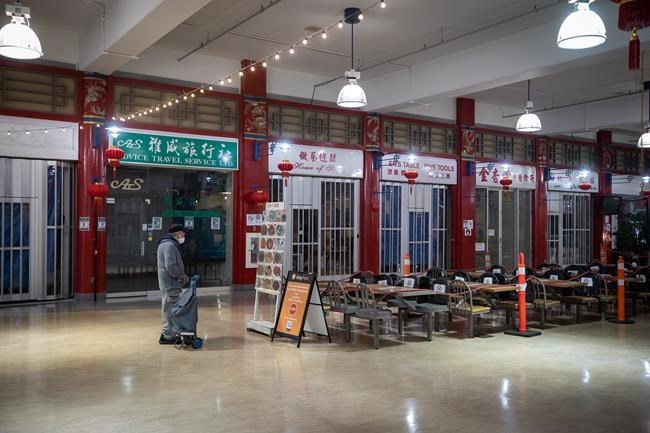The third wave of the pandemic has pushed some restaurants into taking an intentional break ahead of patio season while provinces remain under tight COVID-19 restrictions to keep the virus spread under control.
Some restaurant owners said keeping staff safe at a time when the number of cases of more transmissible variants of COVID-19 continues to grow was one of the reasons behind the decision to close.
"We want to be proactive to protect all our staff, and our family, who are in the age group that is now more at risk," said a note on the website for Toronto restaurant Olde Yorke Fish and Chips.
The midtown area restaurant said the weeks-long hiatus, which includes its takeout service, is due to the record number of COVID-19 cases and the surge of variants in the city.
"We hope that vaccines will be given to essential workers, as we have been in the front lines of exposure all this time," wrote the Toronto restaurant on its social media page, adding that the restaurant will open again when the owners "feel comfortable with the situation in Toronto."
Ottawa restaurant Town said it was closing for at least a week or longer for what it called a mental health break.
"The current numbers are alarming, the hours recently have been long and we are all feeling the effects," the restaurant said in a post on its Instagram account.
"We think a little time to stay home, connect with our families and partners and taking time to decide how we are all feeling without the pressures of service is just what we all need."
Rasa Restaurant, located in Toronto's Harbord Village neighbourhood, said Ontario's latest stay-at-home order made management decide to provide its staff "a well-deserved and much needed 28 days of rest."
"We are not prepared to put our staff under any further mental or physical strain due to the sporadic nature in which the government makes their decisions and more importantly, relays those decisions," said the restaurant.
Toronto, along with neighbouring Peel Region, have been under lockdown measures since November. Outdoor dining was briefly allowed in late March but was reversed just after a few days when the government placed the whole province under “emergency brake” shutdown restrictions.
The most recent closure of patios and any kind of dining was the last straw for a large number of restaurants, said James Rilett, vice-president of Central Canada for Restaurants Canada.
"They just didn't feel that they could do it anymore, to continue this open and close, open and close. (They said) that they were going to stay closed until it was clear that they would be open for good," said Rilett in an interview.
For some restaurants, like Rasa, the decision was for their mental health but for others, it was for financial reasons, he said.
"Every time you're forced to close, you lose a lot of money that you have to then spend again when you reopen," Rilett added.
Meanwhile, some restaurants have used their temporary closure as a time to perform renovations and make improvements to their business.
On Saturday, Clansey's Bar and Restaurant in Rossland, B.C., closed following British Columbia's temporary ban on indoor dining on March 29, which has been extended into May.
Clansey's has taken this time to renovate its kitchen and create a new rooftop patio, as well as improve its menu to include new summer food and drinks.
The restaurant has intended to close anyway as a "strategic move," said its executive chef, Jason Mekdeci.
"We decided that we were always going to have a closure in order to give us some time after the (ski) season to work on the restaurant," he said.
Mekdeci said he and the restaurant owner planned to keep Clansey's closed until May 13, but settled on remaining closed until at least early June after the ban on indoor dining was extended.
Restaurant Canada's Rilett said patio or outdoor dining should be allowed again as soon as possible, adding that this is a "fairly safe activity."
It is common for some restaurants to close when in-person dining is prohibited because they can't pick up enough customers to make takeout operations worthwhile, he said.
Rilett added that opening up patios had made a difference in restaurant revenues last summer, helping restaurants at least break even.
"If they're going to extend the emergency order, we'd like to know that as soon as possible so restaurants can plan. And going forward, I think we want to be part of the solution."
This report by The Canadian Press was first published April 28, 2021.
Denise Paglinawan, The Canadian Press



